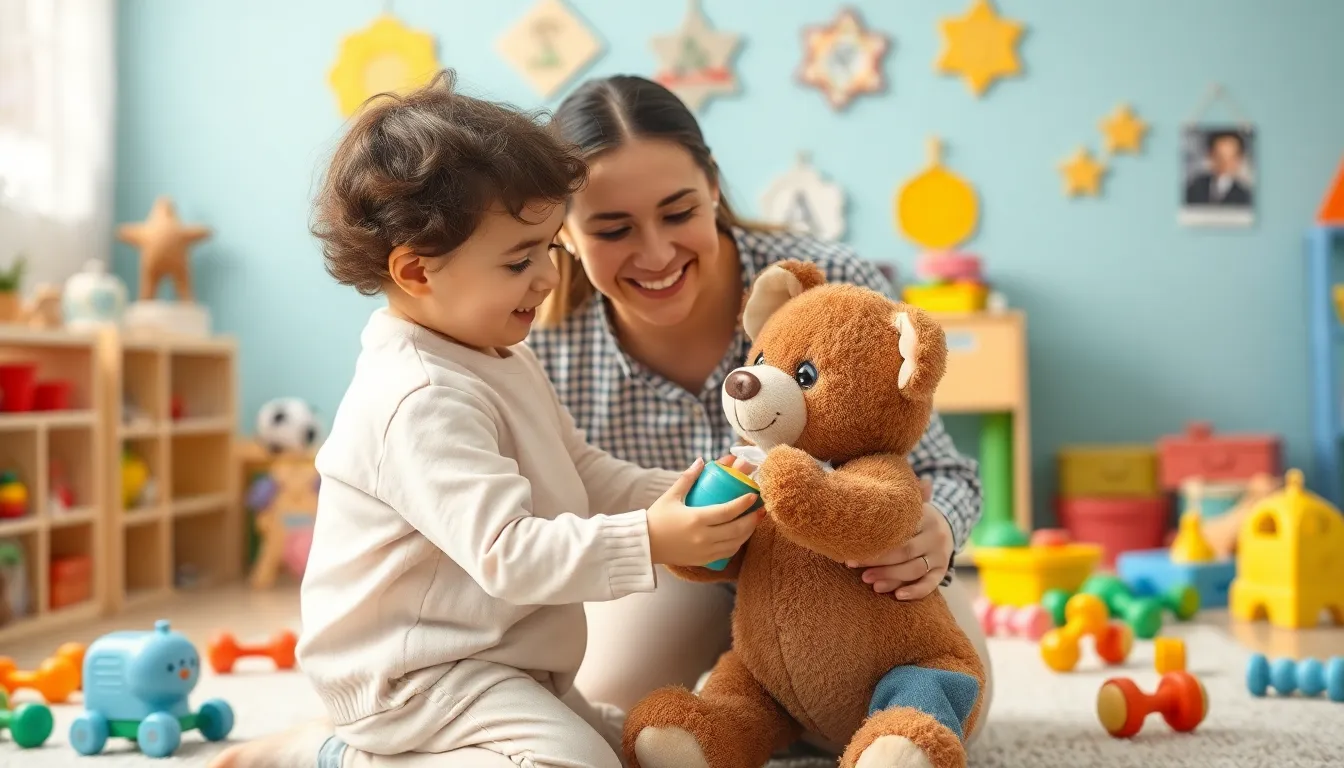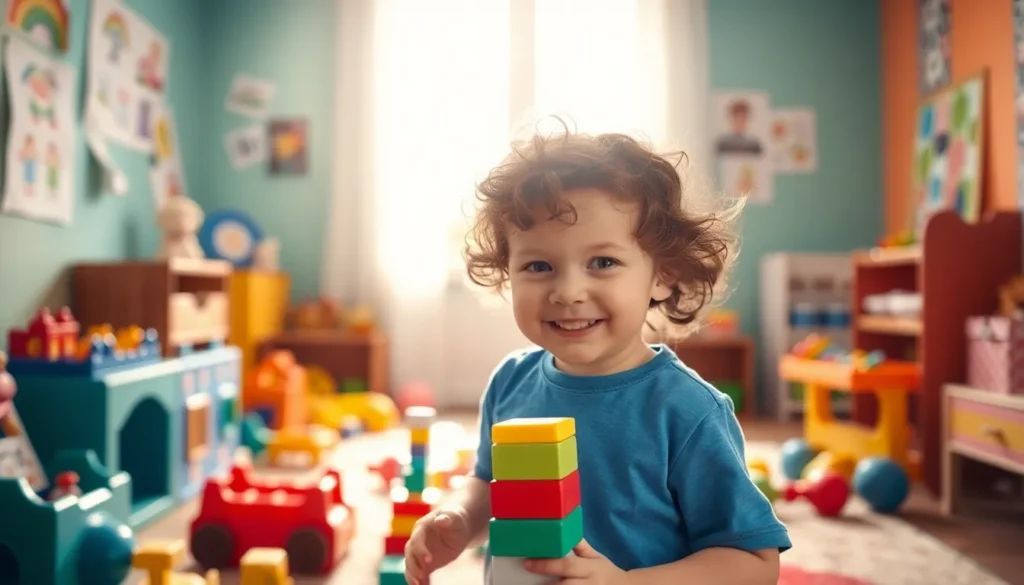Table of Contents
ToggleNavigating the wild world of toddler behavior can feel like trying to tame a tornado. One minute they’re giggling over a game of peek-a-boo, and the next, they’re in a full-blown meltdown over the color of their cereal. Every parent knows that toddlerhood is a rollercoaster ride filled with unexpected twists and turns. But fear not, because with the right tips and tricks, it’s possible to turn those chaotic moments into opportunities for growth—and maybe even a little laughter.
This guide dives into effective strategies for understanding and managing toddler behavior. From tantrums to triumphs, these insights will help parents transform challenging situations into teachable moments. So grab a snack, take a deep breath, and let’s explore how to navigate this delightful yet demanding stage of childhood with confidence and a smile.
Understanding Toddler Behavior
Understanding toddler behavior requires insight into the emotional and psychological development stages. Recognizing how these stages influence actions helps parents navigate this unpredictable time.
Developmental Stages
Developmental stages occur rapidly during toddlerhood. Between ages 1 and 3, toddlers experience significant growth in motor skills and cognitive abilities. This period features milestones, including walking, speaking simple words, and expressing emotions. Parents notice increased independence as toddlers seek autonomy but also a need for security. During these crucial years, behaviors serve as communication tools for feelings and desires.
Common Behaviors in Toddlers
Common behaviors manifest as curiosity, defiance, and emotional outbursts. Curiosity drives toddlers to explore their surroundings, leading to questions and risks. Defiance might emerge as they assert independence, often resulting in power struggles. Meltdowns frequently occur due to frustration over unmet needs or difficulty in expressing themselves. Parents encounter different expressions of emotions, such as joy or anger, reflecting their toddlers’ developing identity. Addressing these behaviors with patience fosters healthier emotional responses.
Effective Parenting Strategies

Understanding toddler behavior requires effective parenting strategies. Several techniques can help parents manage these challenging moments.
Positive Reinforcement
Using positive reinforcement encourages desirable behaviors. Praising toddlers when they share toys can reinforce that behavior. Offering stickers or small treats after successfully completing a task motivates them to repeat the action. Celebrating achievements, no matter how small, builds confidence and fosters a positive environment. Consistent reinforcement strengthens the bond between parent and child, creating trust. This method teaches toddlers the value of good behavior while helping them understand expectations.
Setting Boundaries
Establishing clear boundaries provides toddlers with a sense of security. Dictating rules regarding safety helps them navigate their environment. Implementing consistent consequences for crossing established limits aids in understanding acceptable behavior. Engaging them in discussions about why certain behaviors are off-limits fosters comprehension. Toddlers thrive on routine, so maintaining consistency in rules creates a predictable atmosphere. This stability allows them to feel safe while learning about appropriate behavior within set boundaries.
Dealing with Challenging Behaviors
Managing challenging toddler behaviors requires practical strategies. Parents can effectively address two common issues: tantrums and sharing.
Tantrums and Meltdowns
Tantrums often surface due to frustration or exhaustion. Redirecting attention can effectively diminish the intensity of the situation. Offering choices gives toddlers a sense of control, reducing feelings of helplessness. Using calming techniques, such as deep breathing or cuddling, can help toddlers regain composure. Acknowledge their feelings, and validate their emotions to promote understanding. Consistent responses to tantrums foster stability. After calming down, discussing feelings can reinforce emotional understanding.
Refusing to Share
Refusing to share is a typical behavior during toddlerhood. Addressing this requires patience and modeling appropriate behavior. Reading books about sharing can spark conversations. Encouraging turn-taking during playtime teaches sharing in a fun way. Praising toddlers for sharing reinforces the behavior. Setting an example by sharing personal items helps toddlers learn through observation. Using positive reinforcement creates a supportive environment. Ultimately, these methods cultivate a sense of empathy and cooperation.
Encouraging Positive Behavior
Encouraging positive behavior in toddlers involves innovative strategies that foster growth and understanding.
Role-Playing and Modeling
Demonstrating appropriate behaviors through role-playing encourages toddlers to learn by example. Engaging children in simple scenarios, such as pretending to share toys or taking turns, cultivates social skills. Toddlers benefit from observing adults model kindness and patience. Using everyday situations to showcase problem-solving promotes emotional intelligence. Families can enhance learning by discussing the importance of behaviors after role-playing. Such conversations reinforce understanding and make lessons more memorable.
Creating a Routine
Establishing a predictable routine helps toddlers know what to expect, reducing anxiety and promoting positive behavior. Consistency in daily activities like meals, playtime, and bedtime supports a sense of security. Families should create visual schedules to illustrate daily tasks, making them more accessible to toddlers. Consistent routines teach children self-discipline and time management. Positive reinforcement practices during routine activities further encourage desirable behaviors, creating a harmonious home environment. Predictability nurtures trust and fosters growth in emotional regulation.
Navigating the whirlwind of toddler behavior can be challenging yet rewarding. With the right strategies in place parents can transform difficult moments into valuable learning experiences. Understanding a toddler’s emotional needs and developmental milestones is crucial for fostering a nurturing environment.
By implementing techniques like positive reinforcement setting clear boundaries and maintaining consistent routines parents can encourage healthy emotional responses. This approach not only enhances the parent-child bond but also equips toddlers with essential skills for their growth. Embracing this journey with patience and humor will lead to more harmonious interactions and a deeper connection during these formative years.







